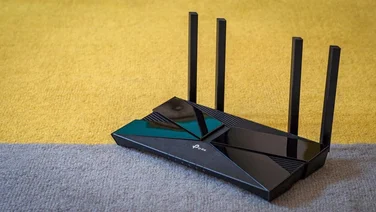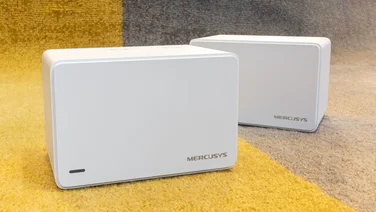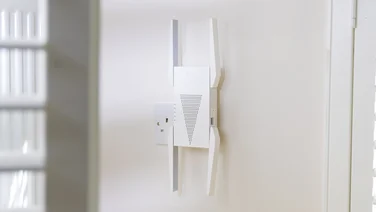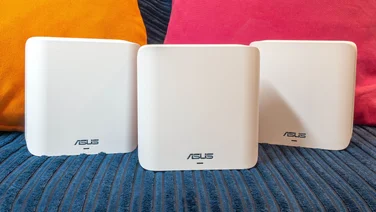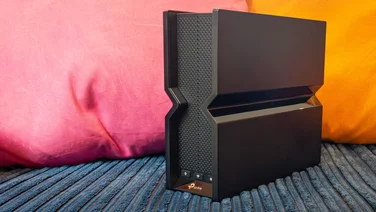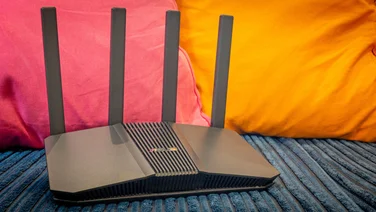To help us provide you with free impartial advice, we may earn a commission if you buy through links on our site. Learn more

- Incredibly quick
- Powerful enough to run a Plex Server on its own
- Six Gigabit Ethernet ports
- Very expensive
- Hugely pricey
- Enormously costly
Wireless technology has received a bit of a boost of late, what with the emergence of multi-box mesh wireless systems such as BY Whole Home Wi-Fi and Linksys Velop and Google Wifi. But sometimes only a traditional single-unit router will do. Although traditional routers typically don’t have the same throughput over distance as mesh Wi-Fi systems, the good ones usually have more features and are far more configurable. The Netgear Nighthawk X10 is comfortably one of the most advanced I’ve ever come across.
The Netgear Nighthawk X10 is also hands down the most expensive router we’ve ever tested. It will set you back £400, more than a games console or a cheap TV, as much as a decent washing machine and it’s pricier even than mesh Wi-Fi systems. But in 2017, spending £300-£400 to get your Wi-Fi sorted is beginning to look like the going rate.
Netgear Nighthawk review: What you need to know
What do you get for your money, then? The first thing to note is that the X10 doesn’t come with an ADSL/VDSL modem built in, which is disappointing for the price. But otherwise it’s a router with more features and power than you could ever possibly want. It has six Gigabit Ethernet ports and 802.11ac Wi-Fi, it can run a Plex Server natively from any connected hard disk or USB thumbdrive, and it’s the fastest, most powerful wireless router we’ve tested.
Netgear Nighthawk review: Price and competition
At £400, there’s not much direct competition for the Nighthawk X10, but the TP-Link Archer VR2800 is our current favourite and it’s just as quick over Wi-Fi and half the price at £200. It may suit your needs if you don’t need the extra features of the Nighthawk X10. If you already have a router and all you need is better Wi-Fi coverage, consider either BT Whole Home Wi-Fi, which is a bargain £200 right now, or Google Wifi, which is the cleverest, most user-friendly mesh network system, for £202.

Netgear Nighthawk review: Features and performance
As I said, this router is right at the bleeding edge and it’s fully stacked with the very latest in wireless tech. The X10 is a tri-band 802.11ac wave 2 router, and it supports MU-MIMO and 160MHz channels for link speeds up to 1,733Mbits/sec on each of its 5GHz networks and 800Mbits/sec on its 2.4GHz network.
It has a 1.7GHz quad-core processor and four external antennae with embedded amplification for the strongest possible signal. There’s also support here for the next-generation wireless standard, 802.11ad, for potential short-range speeds of up to 4,600Mbits/secs at 60MHz. This is more future-proofing than practical, though, as hardly any devices support the new standard right now.
Over normal Wi-Fi, though, the Nighthawk X10 is a champ and, in our throughput tests, it was the fastest overall single-unit router I’ve seen. I measured download rates of 102MB/sec at close range – that’s nigh-on Gigabit Ethernet speed – and 17.1MB/sec at long range in my tough kitchen location in a notorious black spot in my house.
The only systems significantly faster than the X10 at long range are the multi-point mesh Wi-Fi systems, which cost up to £500. At £400, the X10 might be expensive, but it clearly isn’t completely out of line with the market rate.
And, in many respects, this router offers much more than all these multi-box systems. For one, if you don’t have one already, it’s one of the few routers on the market that can truly be considered a true replacement for a proper NAS drive.
The USB transfer rate is ridiculously quick at 75.8MB/sec over wired Gigabit Ethernet and with that powerful processor inside, it should be able to deal with multiple connections without too much hassle. And there’s the software here to back it up as well.
Netgear’s ReadyCloud system provides easy remote access to your files; ReadyNAS Vault lets you back up files from PCs and laptops to connected USB drives; and there’s also Amazon Cloud drive support, so you can mirror files to the cloud automatically. Strangely, though, this only supports single-folder backup.

There’s also DLNA, TiVo and iTunes media server support and, impressively, the Nighthawk X10 can also run a Plex media server natively. The X10’s CPU is even powerful enough to transcode video on the fly for remote streaming.
Finally, if the onboard USB storage features aren’t enough for you, the X10 has six Gigabit Ethernet ports, two of which can be teamed together for a 2Gbits/sec NAS drive connection and there’s also an SFP+ port so you go right the way up to 10Gbits/sec if you want to.
Perhaps the one disappointment is that Netgear hasn’t hugely overhauled its Genie software at the same time as packing in so much hardware. While Genie is reasonably comprehensive, it has some strange gaps and inconsistencies. For example, while you can set parental-control content-filtering levels using OpenDNS on a per-device basis, the feature is only available via the accompanying smartphone app, not via the router’s web management pages.

Likewise, although it’s possible to block and pause internet access by device, you can’t apply a schedule per device, which is a basic feature we’d expect all routers to offer. Still, you can tweak most other settings on the router and it has a couple of useful extras: OpenVPN support and a BitTorrent downloader.
Netgear Nighthawk X10 review: Verdict
The Nighthawk X10 is an impressive router, no doubt about that. It’s the fastest router around and has great range. It’s extremely powerful and packed with features, although there are some odd omissions. For most people, though, £400 would be better spent on a multi-box system such as Google Wifi or BT Whole Home WiFi, while the TP-Link Archer VR2800 offers the same sort of speed, if not the same magic box full of features.


